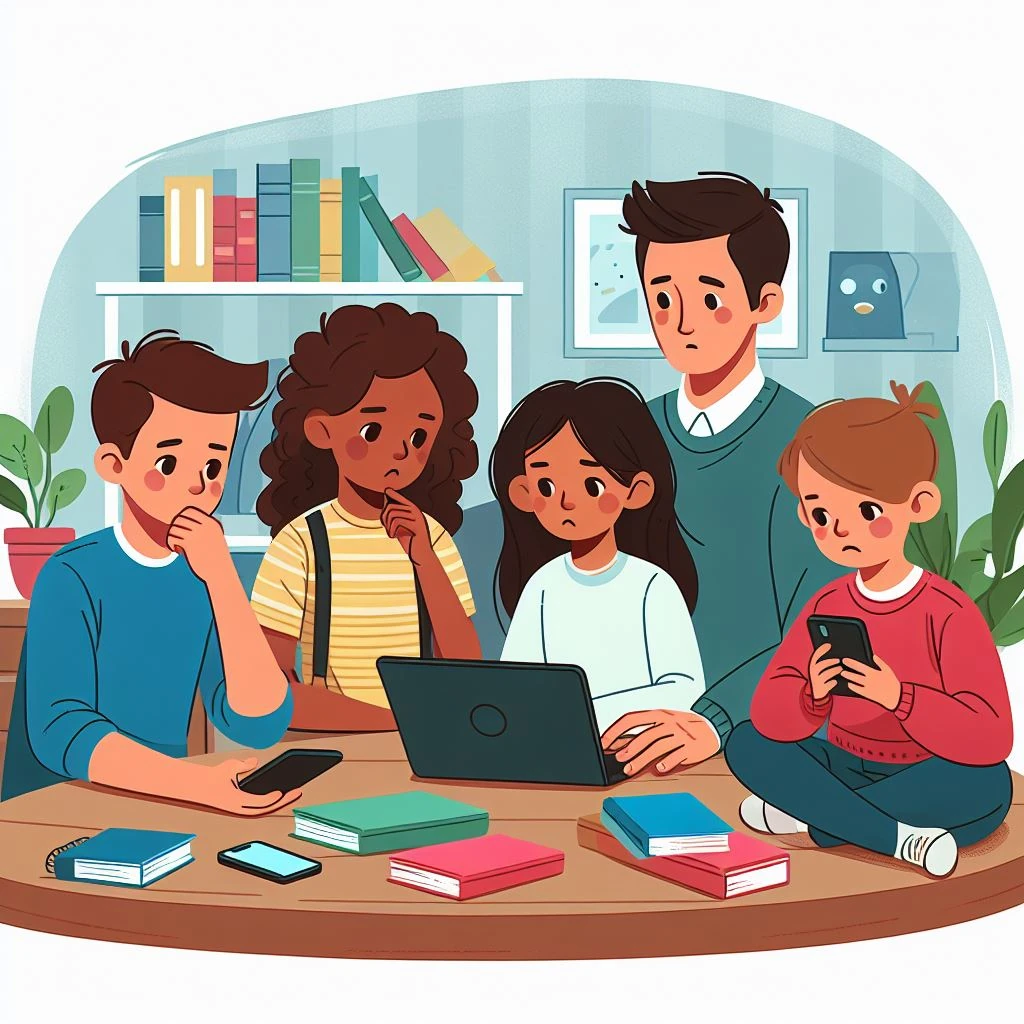We understand the importance of teaching kids about internet safety in a way that truly sticks. That’s why we’ve put together a blog post to shed light on the dangers lurking online. Our aim? To show children firsthand how effortlessly an online predator can create a fake social media account, posing as one of their own.
By watching our video, your child will grasp a crucial lesson about digital citizenship: that not everyone they encounter online is who they claim to be. But our support doesn’t end there! We’ve prepared some discussion questions to facilitate meaningful conversations with your child after viewing the video. Because being savvy in the digital world extends beyond just avoiding strangers, we’ve curated a resource bank at the end of this post. It’s packed with links to insightful blog blog, advice from online safety experts, and support from trustworthy nonprofits. Let’s empower our kids to navigate the online world safely and confidently!
Let’s Talk: Reflecting on Internet Safety

You’ve taken an important step by watching the video together with your child. Now, let’s dive into some conversation starters to ensure they grasped the key points and relate them to their own experiences. These prompts will help you open up a dialogue, gaining valuable insight into your child’s perspective on this crucial topic.
-
Did anything surprise you?
- Encourage your child to share their thoughts and reactions to the video. Emphasize that there are no wrong answers, and you’re interested in hearing their perspective.
-
Have you ever had a strange or uncomfortable encounter online? How did you handle it?
- This question allows your child to reflect on their own experiences and actions. It’s important to reassure them that they can always come to you if they encounter anything unsettling online.
-
Why do you think it’s important to be cautious when interacting with people online?
- This prompts your child to consider the potential risks of online interactions and reinforces the importance of being vigilant and discerning.
-
Do you know how to identify red flags or warning signs when chatting with someone online?
- Use this question to gauge your child’s awareness of online safety cues. Offer guidance and examples to help them recognize potential dangers.
-
How can we ensure that we’re using the internet safely and responsibly?
- Encourage your child to brainstorm strategies for maintaining online safety, such as verifying identities, setting privacy settings, and being cautious about sharing personal information.
Exploring Online Safety for Kids 6–9
Children in this age group may not have extensive experience interacting with strangers online, as their internet usage often revolves around watching videos, playing games, and communicating with close family members. Here are some gentle approaches to introduce the concept of online safety:
Drawing Parallels with Real-life Stranger Danger:
To initiate the conversation, draw connections between real-life stranger danger and its online counterpart. If you’ve previously discussed this topic, build upon it. If not, you can refer to this helpful guide on stranger safety.
- Begin by asking: “Do you remember our talk about stranger danger and why it’s important to stay cautious around people we don’t know?”
- Follow up with: “Did you know that just like in real life, there are strangers on the internet too? Why do you think it’s essential for us to be careful when interacting with them online?”
Remember to maintain an open and supportive atmosphere during these discussions, reassuring your child that they can always come to you with any questions or concerns they may have about online safety.
Discussing the Dangers of Tricky People Online
Let’s approach the topic of online safety in a way that’s age-appropriate and light-hearted, focusing on the concept of “tricky” people rather than delving into scary details about predators.
Explaining Why Tricky People Are Dangerous:
- Ask: “How would you feel if a grown-up dressed up as a kid? You’d notice, right? But on the internet, it’s not always easy to tell.”
- Follow up with: “Sometimes, when you’re playing games or watching videos online, adults pretend to be kids. They do this to trick other kids into trusting them more easily.”
Illustrating Example Situations to Understand How Tricky People Operate:
- Say: “Imagine you’re playing Fortnite and using your microphone. What if you heard a grown-up voice asking where you live?”
- Follow up with: “If anything like that happens, always remember to tell me. I promise I won’t be mad — I just want to keep you safe.”
Using Analogies for Better Understanding:
- Ask: “If a stranger asked for the keys to our house, what would you do?”
- Follow up with: “It’s similar online. If someone asks for our address or phone number, you say no and let me know right away.”
Clarifying That Tricky People Are the Bad Guys:
- Say: “Remember, if a tricky person ever sends you a message, it’s never your fault. You did the right thing by telling me.”
Navigating Online Safety for Teens (Ages 14–17)
As teenagers immerse themselves further into the digital world, discussions about online safety become more crucial and nuanced. Here are some prompts to engage in serious and mature conversations with teens:
Encouraging Critical Thinking about Online Interactions:
- Ask: “The video highlighted that adults often don’t communicate like kids online. What are some red flags that could indicate an online stranger is actually an adult?”
Exploring Responses to Stranger Messages:
- Ask: “What would you do if a stranger started messaging you?” To delve deeper, present scenarios such as if they claimed to be a friend of a friend, seemed exceptionally friendly, or shared similar interests.
Understanding the Reality of Online Interactions:
- Ask: “Have you ever encountered strangers online, perhaps in group chats?” Emphasize that not everyone in online group chats may be known personally, highlighting the importance of caution.
Reinforcing Support and Understanding:
- Say: “No matter how you respond to a stranger online, it’s important to know that it’s never your fault.”
Raising Awareness About Online Grooming:
- Consider reading this article about online grooming with them. It sheds light on the tactics of predators and emphasizes the importance of being vigilant online.
Empowering Families with Digital Citizenship Resources
Ensuring the online safety of your children is an ongoing journey as they navigate the digital world. Digital citizenship encompasses various aspects of their online experiences, from texting and social media to school work and gaming. Here are some valuable resources to turn to when you need guidance. And remember, when in doubt, open communication is key.


Comments